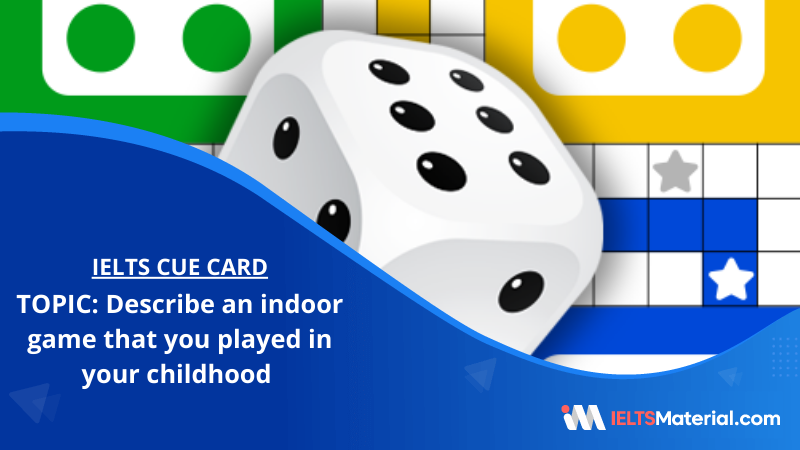Describe an indoor game that you played in your childhood – IELTS Cue Card
3 min read
Updated On
-
Copy link
Do you want to know how to answer the cue card on “Describe an indoor game that you played in your childhood?” Here’s our sample Band 9 answer to make you achieve your desired score.
Table of Contents

Limited-Time Offer : Access a FREE 10-Day IELTS Study Plan!
Describe an indoor game that you played in your childhood
You should say:
- What it was?
- Who do you play it with?
- How do you play it?
Sample Answer 1
I, like other youngsters, have participated in a variety of indoor and outdoor activities, and I continue to do so whenever I get the opportunity. Among such games, the carrom board game is one that I still like playing. It’s a number-based indoor board game that can accommodate 2 to 4 players at a time.
I usually played it with my friends on weekends and with my family and cousins during my school vacation. This game captivated me at the time, probably because of the colorful board with brilliant colors and dice. Additionally, unlike chess or monopoly, it was not a difficult game in which I had to strategize to make strategic movements. Instead, it’s a basic game that even small children can grasp and enjoy. In reality, I’ll admit that it was my father who taught me how to play this game. He wanted to teach me how to play a game in a healthy spirit, and he thought that playing this game would be a fun way to do it.
Playing this game is easy. It involves nine black or dark playing pieces, nine white or light-colored playing pieces, a red queen, and a striker. Every player gets one hit via the striker with the colored pieces. The goal is to flick your striker at the Carrom pieces with your finger, causing them to fall into one of the four corner pockets. The first player or team to collect all of their pieces and the queen is the winner.
My father used to purposely lose games so that I could win, as I recall. I used to be overjoyed when I beat him. It’s a wonderful game to spend quality time with our loved ones and form bonds.
Sample Answer 2
I used to play ludo at my home when I was a kid. In fact, ludo is still one of my favorite indoor games and is popular amongst Indian families. It is still etched in my mind that this game was introduced to me by my elder brother. So I have fond memories of my childhood when playing this game.
Everyone in my family used to enjoy playing this game in their spare time, and they still do. We used to play together as a family whenever everyone got home from work in the evenings or afternoons, or whenever we were free on weekends. It has evolved into a favorite pleasure game for spending quality time with our family while smiling, giggling, and engaging in friendly competition.
Playing ludo does not require any special skill. You don’t even need any prior knowledge of the game to play it. All you have to do is to roll the dice and move your pieces across the board. Each player takes a turn and rolls the dice to determine their next move. The objective of the game is for each player to move all four of their pieces around the board once clockwise, up the home column, and into the home triangle. A player must first roll a six to move a piece from the base to the start position.
Because we did not have any outdoor area to walk about, playing ludo became our preferred hobby among my relatives. As a result, the elders organized the ludo to prevent our mischievous activities at home. Due to this, almost every one of my cousins, including myself, is now a skilled ludo player.
Vocabulary
- Etched – imprinted vividly on someone’s mind or memory.
Eg: The ugly scene from the movie is still etched in Joan’s mind. - Evolved – develop gradually
Eg: Trixi has evolved into a confident teenager. - Giggling – laughing lightly and repeatedly in an excited, nervous, or silly way.
Eg: I could hear the boys giggling in the room. - Determine – cause (something) to occur in a particular way or to have a particular nature.
Eg: The votes are going to determine who the next President is going to be. - Mischievous – causing or showing a fondness for playfully causing trouble.
Eg: Diana is a mischievous child.

Start Preparing for IELTS: Get Your 10-Day Study Plan Today!
Recent Articles

Haniya Yashfeen

Kasturika Samanta

Nehasri Ravishenbagam





Post your Comments